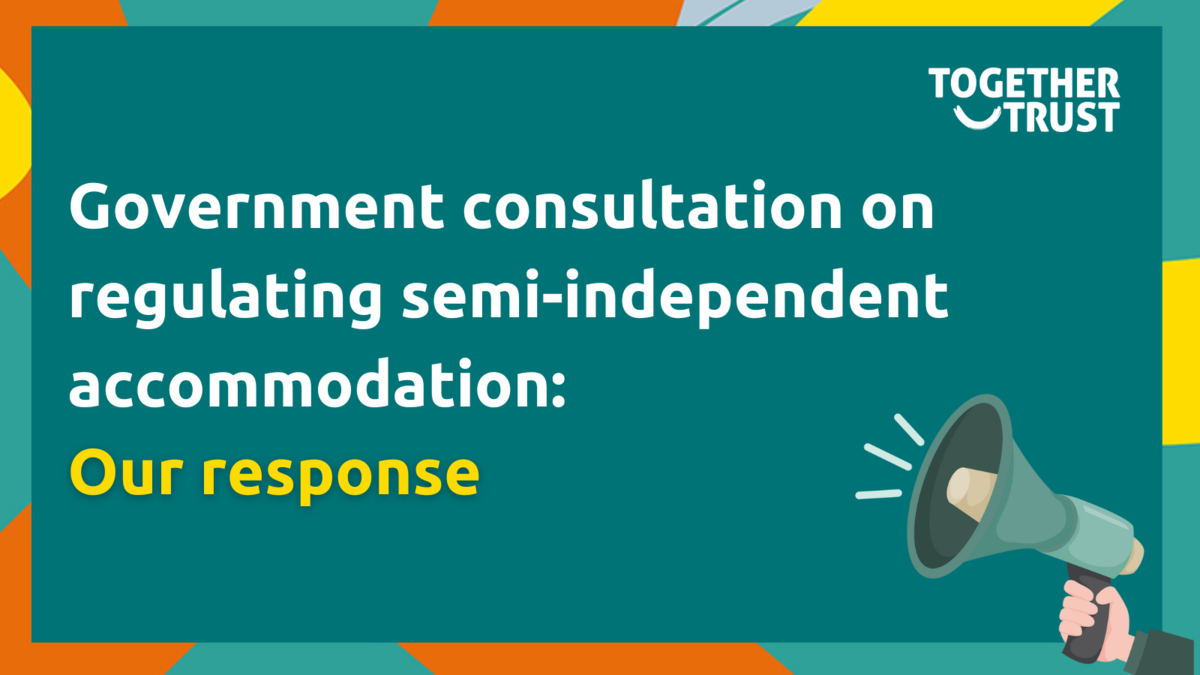Our response to the government’s consultation on regulating semi-independent accommodation

Today, we have outlined our concerns to the Department for Education about their plans to regulate semi-independent accommodation for 16- and 17-year-olds. You can read our full consultation response here. Below are five reasons why we believe that the new regulation and inspection regime is not a step in the right direction, and why the government should urgently extend existing care standards to cover all children.
1.The new regulations will not protect children’s safety
The new regulations fall short of ‘every child having a stable, loving and safe home’. While staff working with children in semi-independent accommodation need DBS checks, what about adults who share a kitchen or living room with a child?
The new protection standard says that young people should not feel isolated because of their accommodation or support. No professional working with children would want that. But can staff truly ensure that children living in a bedsit feel a sense of belonging? We don’t think so.
It is not possible for the registered person or staff, who are not always physically on-site, to keep children who are living in shared accommodation with vulnerable adult’s safe. It is not a fault of the workforce; it is a fault of the nature of semi-independent accommodation.
2. The regulations are not trauma informed
Most children enter care after experiencing either abuse or neglect, experiences which are linked to physical illness, depression and even death. Children who have lived through trauma may demonstrate ‘hyper-independence’ as a response to surviving without help and care from other people.
The whole rationale for semi-independent accommodation is that some children are ready for independence at a young age. Children may feel ready for the independence that comes with living alone, but that does not mean it is in their best interest to live without care.
We know that there are children living in semi-independent accommodation who should be living in foster care or children’s residential care. Instead, they are living in a bedsit because it’s the only place available. Children who are removed from the care of their parents because of abuse or neglect must not live in accommodation which is, by nature, neglectful.
3. Caravans and barges as emergency accommodation
Previously semi-independent accommodation was thought of as accommodation that should only be used in emergencies. Now, there are almost as many children aged 16 and 17 living in semi-independent accommodation as in regulated children’s homes.
In the new regulations, it says that caravans and barges, impermanent settings, should only be used in exceptional circumstances. Yet we know the children’s social care system is in crisis. Unless systemic problems are addressed, and more funding is allocated, local authorities will continue to be forced into making decisions which are exceptional daily.
The recent recommendations of the review into Children’s Social Care suggest stability and permanency are critical for children where they cannot remain with their families, and according to the Children’s Commissioners Big Ask Survey, one of the most pressing concerns for children in care is a stable and nurturing home.
On a practical level, mobile and non-permanent settings cannot possibly meet the quality standards laid down in the new regulations.
4. The new inspection regime is not up to scratch
Under the new inspection regime, a small sample of providers' accommodation will be inspected by Ofsted every three years. The likelihood is that there will be accommodation where children live which may not be inspected by the regulator within a ten-year period.
The lack of oversight is appalling, given that 29 deaths of 16- and 17-year-olds have occurred within semi-independent accommodation over the last five years. We firmly believe that every setting where a child lives should be inspected to a high standard.
5. There will be unintended consequences
Children’s homes which are struggling financially and those who provide poor quality care may be attracted to change their function to provide support instead of care, as the quality standards that providers will need to meet are less comprehensive.
Already, local authorities have limited options about where to place a child. Increasingly, deprivation of liberty orders is being made on the basis that there are no suitable homes available for children with complex needs. This desperate situation means that decisions are already being taken which are not in accordance with a child’s best interest. Implementing this regime will do nothing to change this situation.
The impact of this on the broken care ‘market’ will be a relative surplus of semi-independent accommodation in contrast to the scarcity of regulated, caring settings. The oversupply of semi-independent accommodation will make it cheaper for local authorities to commission, and the scarcity of regulated placements will make them overall the more expensive choice.
If funding for local authorities does not increase to a level at which they are able to commission the right type of care for a child, rather than the cheapest support available, we are concerned that semi-independent accommodation will become the default choice for children in care.
The alternative
There is a real alternative to the new regulatory regime. The government could ensure that the Children’s Homes Regulations 2015 covers all children living in residential care settings.
They could make a commitment to phase out the use of semi-independent accommodation, mindful of the recommendation made in the Care Review that “all children should receive care where they live by 2025”.
They could invest the initial £145 million cost of the new regulatory and inspection regime into helping providers of semi-independent accommodation register and drive up their standards to that which amounts to care, not support.
Read more:





